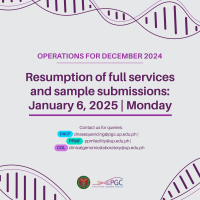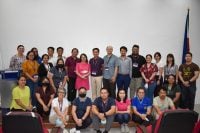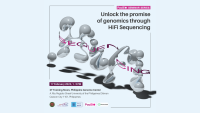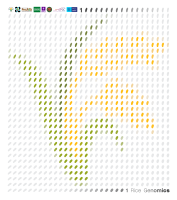The joint initiative stands to deliver a huge amount of data from the genome sequences of the 1001 Philippine TRVs. This will be made available to the public via the PH Rice GDB. From strengthening local expertise in crop genomics and bioinformatics, to providing more research opportunities—the program anticipates its potential in increasing and strengthening research output and capacity. The 1001 Rice Genome (1k1RG) Program is a promise to the future of rice in the Philippines as it ultimately aims to benefit farmers through accelerating the improvement and production of rice varieties.

Operations schedule for December 2024
Please be reminded of the following schedule of operations for the DNA Sequencing Core Facility (DSCF), Protein, Proteomics, and Metabolomics Facility (PPMF), and Clinical Genomics Laboratory (CGL): Last day of sample submissions (previously announced): November 29, 2024 Resumption of full services and acceptance of samples: January 6. 2025 | Monday

Clinical Geneticist-Molecular Genetic Pathologist now heads the Philippine Genome Center
The Philippine Genome Center of the UP System welcomes Felicitas L. Lacbawan, MD who used to teach at the Department of Human Biochemistry and Molecular Biology at the UP College of Medicine. Dr. Lacbawan, a former chief medical officer for genetics and genomics in the US rejoined the University to rise to the challenge of […]

PGC partners with NCMH for a mental health tissue biobank and multi-omics capacity building program
In collaboration with the National Center for Mental Health (NCMH), the genome center launches a capacity-building program on mental health tissue biobank and multi-omics. By centering capacitation efforts towards awareness-building workshops and activities, the program will identify key NCMH staff and consultants which will ensure the sustainability of biobanking and multi-omics research efforts at the […]

DOST genomics press conference held at PGC
The Department of Science and Technology (DOST) hosted a genomics press conference at the Philippine Genome Center on April 14, 2023 with the theme, “From Labs to Lives: Impact of DOST-led Genomics Program in the Philippines”. DOST officials sat down with the PGC executive committee for an alignment meeting before the press conference. PGC Executive […]

Call for Applications: PGC Bioinformatics Training & Internship Program 2023
Student applicants must be undergraduate or graduate students in good academic standing, enrolled in a science or engineering course at an accredited college or university in the Philippines. Young professional applicants must have a BS degree in a science or engineering field, and be a researcher and/or faculty member employed at a research or higher education institution in the Philippines.
This will be held during the mid-year period from June 19 to July 28, 2023.

FREE AMR sample sequencing by PGC DNA Sequencing
The DNA Sequencing Core Facility (DSCF) in partnership with Golden Bat and QIAGEN is conducting a FREE sequencing of AMR samples from April 17-19, 2023.
Interested participants shall write a one-page rationale on why they need their sample/s sequenced and send it to dnasequencing@pgc.up.edu.ph with the subject: AMR Sequencing [Entry]_Affiliation_Name
Deadline for entries is on March 31, 2023. For more information, contact Ma. Celeste S. Abad at msabad@up.edu.ph or dnasequencing@pgc.up.edu.ph and/or call 981-8500 loc. 4707
Details on how to send accepted samples will follow.

Dr. Cynthia Saloma of PGC is a recipient of the Presidential Lingkod Bayan award
The PGC team’s dedication and resilience are a testament to the importance of scientific research and its ability to overcome even the most difficult of circumstances. #PGCParaSaBayan

Register now—Prevention and Action: Developing Tools to Protect Children from Exploitation
Aimed at creating awareness on the new developments in forensic investigation in the fight against sexual abuse and exploitation, the webinar “Prevention and Action: Developing Tools to Protect Children from Exploitation” is happening on March 22,2023 at 12:30 pm-5:00 pm.
Medical doctors in the Child Protection Unit, social welfare workers, law enforcement personnel, forensic researchers, and the general community are invited and may register at https://tinyurl.com/FGRP3-Webinar

Unlock the promise of genomics through HiFi sequencing
The DNA Sequencing Core Facility together with Noveaulab will be hosting a seminar on February 17, 2023, “PacBio Seminar: Unlock the promise of genomics through HiFi sequencing”
Date: Tuesday, February 17, 2023
Time: 1:00 PM Philippine Standard Time
Type: Onsite
Dr. Zuwei Qian, PacBio Director of Marketing for the APAC region will be the presenting the following topics:
HiFi reads: a new era for metagenome analysis
The long and short of it: PacBio sequencing for precision medicine

